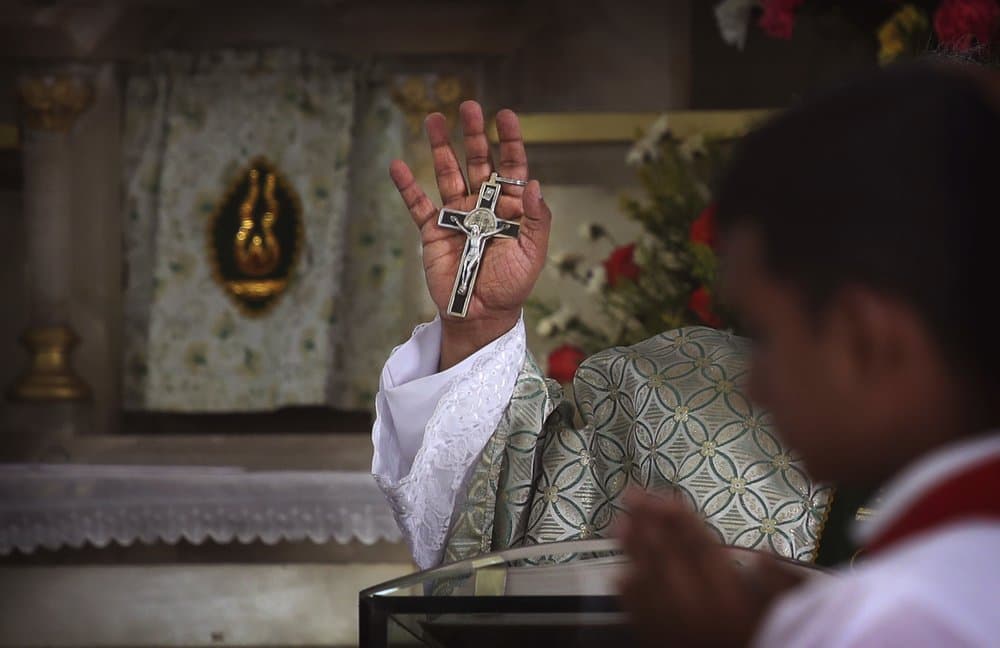MUMBAI, India – Father Binoy John says he “almost died in jail” after being arrested in India over allegations of “forced conversion.”
The priest was released on bail after a week-long detention in India’s eastern Jharkhand state on Sept. 16, after the intervention of local politicians.
The Kerala native told his story to Malayala Manorama, a daily newspaper.
“I almost died in jail,” he said. “They gave me a shot for fever as I requested medical care and medicine for severe chest pain.”
John, who has a pacemaker, said the police refused to take him to a nearby hospital for a check-up.
“They wanted to kill me slowly by denying medical care. The jailer’s intervention saved me,” he said.
“When I told the magistrate that I was on a pacemaker, he remanded me in custody, saying the jail had medical facilities. On the seventh day in jail, I experienced chest pain. I collapsed as soon as the compounder gave a shot on my thigh. Even when my condition worsened on Sunday, they did not take me to the hospital,” Binoy said.
After his release, John was admitted to a hospital in Lalmati, Jharkhand, but hopes to be able to return to Kerala for further treatment.
John works at Rajdaha mission in the Diocese of Bhagalpur in Bihar state. He was arrested in Agiamur, in the neighboring Jharkhand state, but within the boundaries of the diocese.
The police were acting on a complaint from a villager who accused the priests of exercising constant pressure for the locals to convert to the Christian faith. Jharkhand passed an anti-conversion Bill in 2017, and those found guilty of “forced conversion” face up to three years in jail and a large fine.
Jharkhand is ruled by the Bharatiya Janata Party (BJP), which is affiliated with a Hindu nationalist group and also holds power at the national level.
Christians make up about 4.3 percent of the population of Jharkhand, nearly twice the national average. Most of the Christians belong to the marginalized Tribal community, which are India’s aboriginal people who mostly live outside the caste system.
John also faced charges for “land grabbing” related to land purchased nearly a decade ago by the Diocese of Bhagalpur.
“The diocese had bought 22 acres of land in 2010 to start the mission. Some people smashed the compound wall a couple of months back when senior clerics were on leave. I could not understand their language, but it was clear that they did not want construction at the site,” John told the newspaper.
He said the people filed a complaint with the local police, but the case was not pursued since the priest’s land documents were in order.
The local politician who worked for his release, Dean Kuriakose, said the land dispute was at the heart of John’s arrest.
“He was victimised by some local people who were trying to encroach upon tribal land. Father Bijoy is a heart patient and he survives on a pacemaker implant. The police produced a forged medical certificate before the magistrate hiding his health condition to ensure that he was sent to jail. In the jail he developed pain but the jail authorities denied him medical assistance. He was administered pain relievers when he sought medical aid,” Dean told Malayala Manorama.
Cardinal George Alencherry, Major Archbishop of the Kerala-based Syro-Malabar Church, said John’s arrest “amounts to abuse of the legal system.”
In a Sept. 12 statement, the cardinal said the priest’s detention is “a classic case of misusing the provisions of Freedom of Religion Act,” the state’s anti-conversion law.
“This is a denial of freedom of the right to propagate religion and the right to freedom of conscience guaranteed by the Constitution of India,” Alencherry said.
Christians have been facing increased harassment in the state of Jharkhand since two women affiliated with the Missionaries of Charity, the order of nuns founded by Mother Teresa, were arrested last year after being accused of trying to sell a baby from a shelter for unwed mothers.
The alleged child-selling has drawn criticism from Hindu nationalists of the charitable work done by Christian groups in the country, which they say is done for the purpose of proselytism.
Crux is dedicated to smart, wired and independent reporting on the Vatican and worldwide Catholic Church. That kind of reporting doesn’t come cheap, and we need your support. You can help Crux by giving a small amount monthly, or with a onetime gift. Please remember, Crux is a for-profit organization, so contributions are not tax-deductible.















